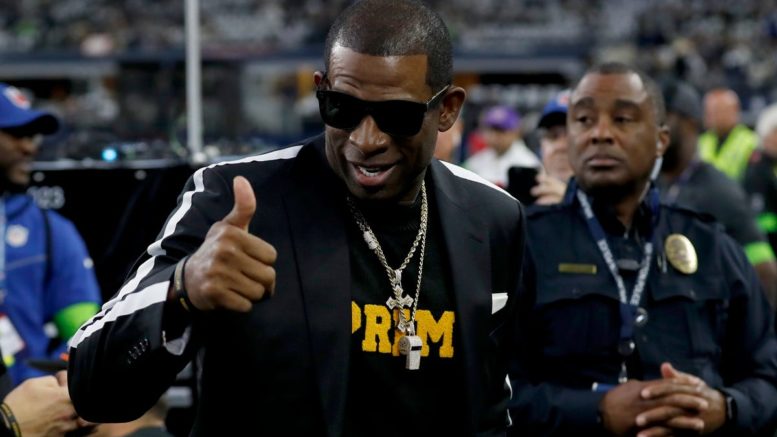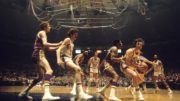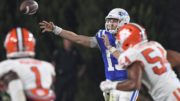One year ago, Deion Sanders’ swift exit from Jackson State’s sideline brought a swell of attention to HBCU football that hadn’t existed in decades. What it didn’t bring were more opportunities for the coaches who are essentially lifers, no matter how much they’ve proven themselves. Before Sanders took the Colorado job, the last time a head coach was plucked from the HBCU ranks was in 2016 when Southern Miss came for Jay Hopson– the first white coach in the history of the SWAC.
Prior to Hopson, Wichita State’s hiring of Willie Jeffries in 1979 to keep their sinking ship afloat was the only example of a PWI D-I program offering a head coaching job to an HBCU coach. Jeffries cracked the door open, but slammed it shut just as quickly. After going 8-3 in his third season, Jeffries coached one more year before the program was mothballed and Jefferies moved on to Howard University.
A year after Sanders took the Colorado gig he is SI’s Sportsperson of the Year and has found Colorado’s pulse, but most HBCU coaches are still invisible during the coaching carousel season. Dozens of coaches have matriculated from FCS, Division II or even Division III programs to FBS level. Brian Kelly is the most prominent success story since claiming a pair of Division II national championships at Grand Valley State. Lance Leipold has risen from championship-winning head coach at a Division III powerhouse to architect behind turnarounds at Buffalo and Kansas.
Willie Fritz clinched JUCO national titles before getting noticed at Sam Houston State before accepting a job at Georgia Southern during their transition to FBS. At Tulane, he reversed their fortunes and this week took a job leading Houston into their Big 12 era. To date, come-ups of that ilk have been hard to come by for Black coaches at HBCU programs.
John Grant, the executive director of the Celebration Bowl, showered Sanders for his shift to Colorado, but lamented the lack of opportunities for his peers.
“What has happened for him is no different than what happens in other circles with a coach’s ascension. People do a great job, they get bigger jobs; they don’t do a good job, they get fired.” Grant told Andscape. “We’re not accustomed to this in the HBCU space where an HBCU head coach moves up to FBS Division [I] as a head coach.”
Take FAMU’s Willie Simmons, for instance. The 2023 SWAC Coach of the Year has amassed a 44-13 record in five seasons at the helm of Florida A&M, qualified for the FCS postseason in 2021, and is a nominee for FCS Coach of the Year.
However, history says that is a longshot. The neglect of HBCU coaches hasn’t shifted much since Jeffries was expected to Magic-Negro Wichita State’s football program out of the dumps in the early 1980s. Ironically, Simmons also served as the offensive coordinator on Hopson’s Alcorn State staff in 2014. The offense that Simmons directed finished second nationally in scoring offense, top 10 in yardage and top five in rushing. Simmons’ successful rebuilds continued at his next two stops in Prairie View and FAMU. But the FBS world has yet to come knocking.
Kyle T. Mosley of Fannations’ HBCU Legends suggested that the former VP of Athletics at Florida A&M from 2019 to 2022 serving as Tulane’s Deputy Athletic Director, where they’re scraping the college football landscape for a Fritz successor, would make Simmons a logical candidate.
However, according to The Athletic’s college football insider, Bruce Feldman, Troy coach Jon Sumrall, Florida State’s offensive coordinator Alex Atkins, Green Wave offensive coordinator Slade Nagle, LSU quarterbacks coach Joe Sloan, and Missouri defensive coordinator Blake Baker are all receiving more buzz currently than Simmons.
History is merely repeating itself if that’s the case. Two years ago, Simmons was a candidate for the FIU job, but was passed over for a retread hire in former Colorado head coach Mike McIntyre. A year ago, Simmons addressed rumors related to South Florida’s vacancy, but the program elected to hire Tennessee’s less-experienced offensive coordinator Alex Golesh over Simmons. This season, Simmons has FAMU at 11-1.
The most realistic route for HBCU coaches is the circuitous one Brennan Marion took from offensive genius at Howard to Power 4 conference position coach and most recently as the play caller at UNLV. But the HBCU head coach to PWI head coaching pipeline is tightly guarded. Marion’s Go-Go offensive scheme was studied by coaches throughout the country, but even he had to accept a demotion to finally call plays again.
On the Division II level, Benedict College coach Chennis Berry has reconstructed Benedict College’s bottom-rung program. In his last two seasons, Berry has accumulated a stellar 22-2 record and advanced through the Division II playoffs after resurrecting a program that was 1-9 and ranked 163rd out of 166 Division II programs in total offense. Berry’s program-building skills have caught the attention of South Carolina State, but the Lance Leipold Hyperloop to Power 4 jobs is merely hypothetical to Black HBCU coaches.
Follow DJ Dunson on X: @cerebralsportex
Original source here
#Deion #Sanders #success #worthy #HBCU #coaches #arent #advancement #opportunities





